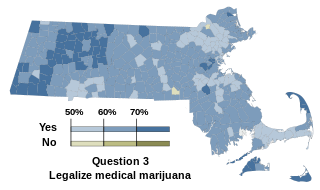
The Elementary and Secondary Education Act (ESEA) was passed by the 89th United States Congress and signed into law by President Lyndon B. Johnson on April 11, 1965. Part of Johnson's "War on Poverty", the act has been the one of the most far-reaching federal legislation affecting education ever passed by the United States Congress, and was further emphasized and reinvented by its modern, revised No Child Left Behind Act.

Proposition 2½ is a Massachusetts statute that limits property tax assessments and, secondarily, automobile excise tax levies by Massachusetts municipalities. The name of the initiative refers to the 2.5% ceiling on total property taxes annually as well as the 2.5% limit on property tax increases. It was passed by ballot measure, specifically called an initiative petition within Massachusetts state law for any form of referendum voting, in 1980 and went into effect in 1982. The effort to enact the proposition was led by the anti-tax group Citizens for Limited Taxation. It is similar to other "tax revolt" measures passed around the same time in other parts of the United States. This particular proposition followed the movements of states such as California.

Arizona Proposition 203, also known as English for the Children, is a ballot initiative that was passed by 63% of Arizona voters on November 7, 2000. It limited the type of instruction available to English language learner (ELL) students. Before Proposition 203, schools were free in terms of ELL instruction to use bilingual or immersion methods. According to a cover letter from the Arizona Department of Education Superintendent of Public Instruction Lisa Graham Keegan to the Arizona Legislature, it was impossible to make a correct analysis regarding how many students were learning through English as a second language programs, as opposed to bilingual education. The school districts had submitted "conflicting information," and 40% had not submitted any data, in spite of three deadline extensions.
Ron Keeva Unz is the editor-in-chief and publisher of The Unz Review, a website that promotes anti-semitism, Holocaust denial, conspiracy theories, and white supremacist material. In addition to Unz's own writings, the site has hosted pieces by white supremacist Jared Taylor, among others.

Three citizen-initiated measures appeared on the November 4, 2008, ballot in Massachusetts.

Proposition 227 was a California ballot proposition passed on the June 2, 1998, ballot. Proposition 227 was repealed by Proposition 58 on November 8, 2016.

A Massachusetts general election was held on November 5, 2002 in the Commonwealth of Massachusetts.

Three citizen-initiated measures appeared on the November 2, 2010, ballot in Massachusetts.

Three citizen-initiated measures appeared on the November 7, 2006 ballot in Massachusetts.

Three citizen-initiated measures were voted upon in the 2012 Massachusetts general election: a Right to Repair initiative, a proposal to allow physician-assisted suicide, and a measure to legalize medical marijuana. The Right to Repair initiative, which was to require open access to vehicle diagnostic and repair information, passed overwhelmingly, with 86% support. The measure to allow physician-assisted suicide failed by a narrow margin, with 51% opposed. The proposal to legalize medical marijuana passed with 63% of voter support.

The Massachusetts Medical Marijuana Initiative, appeared as the third question on the state's 2012 ballot as an indirect initiated state statute. The measure allows cannabis to be used for medical purposes in the state. The initiative—backed by the American Civil Liberties Union, the Massachusetts Patient Advocacy Alliance, and the Committee for Compassionate Medicine—was filed with proponents turning in the required signatures to the Massachusetts Attorney General's office by the August 3, 2011 deadline. Those signatures were needed for the required ten qualified voters who submitted the original petition to put forward the full text of the law they want enacted. The initiative passed with support from 63% of state voters.

The Massachusetts Charter School Expansion Initiative was an unsuccessful initiative voted on in the Massachusetts general election held on November 8, 2016. It was one of four 2016 ballot measures put to public vote.

The Massachusetts Expand Slot Machine Gaming Initiative was a 2016 Massachusetts ballot measure. Also known as Question 1, it was an indirect initiated state statute question that would allow the Massachusetts Gaming Commission to issue an additional license for another slot machine parlor to exist in the state. The ballot question specified that the additional slots parlor be licensed only on a property within 1,500 feet (460 m) of a racetrack and built on a parcel that is at least 4 acres (1.6 ha) in size. The only location in the state where this would have applied was Suffolk Downs in East Boston.

Proposition 58 is a California ballot proposition that passed on the November 8, 2016 ballot. Proposition 58 repealed bilingual education restrictions enacted by Proposition 227 in 1998.

The Massachusetts Gender Identity Anti-Discrimination Initiative is a state-wide referendum passed by Massachusetts voters in the 6 November 2018 mid-term election that prohibits discrimination in public accommodations on the basis of gender identity. The vote upholds language which was already present in the state anti-discrimination statute, defeating an attempt to veto it by public referendum. It is the first state-wide anti-discrimination statute passed by referendum supporting transgender rights in the United States.

The Massachusetts Expansion of Bottle Deposits Initiative was an unsuccessful initiative voted on in the Massachusetts general election held on November 4, 2014. It was one of four 2014 ballot measures put to public vote.

The Massachusetts general election held on November 5, 2002, included three ballot measures that were voted on by the public.

The Massachusetts Casino Repeal Initiative was an unsuccessful initiative voted on in the Massachusetts general election held on November 4, 2014. It was one of four 2014 ballot measures put to public vote.

The Massachusetts Paid Sick Days Initiative was a successful initiative voted on in the Massachusetts general election held on November 4, 2014. It was one of four 2014 ballot measures put to public vote.

Three ballot measures were certified for the November 6, 2018, general election in the state of Massachusetts.






